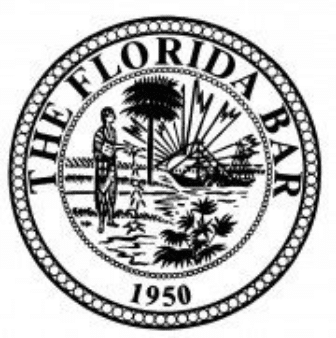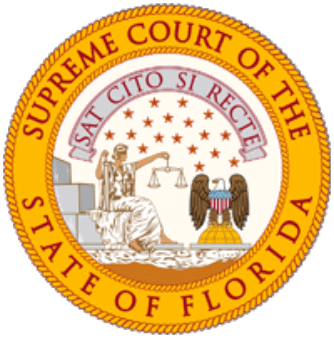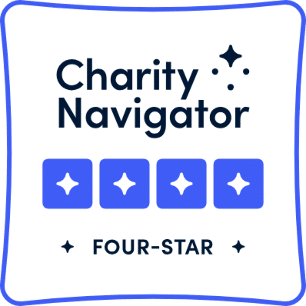 ORLANDO, Fla. – A pioneer in the implementation of Teen Courts across Florida, Kathleen “Katie” Self of Sarasota received The Florida Bar Foundation’s 2011 Medal of Honor Award for a non-lawyer June 23 at The Florida Bar Foundation’s 35th annual reception and dinner.
ORLANDO, Fla. – A pioneer in the implementation of Teen Courts across Florida, Kathleen “Katie” Self of Sarasota received The Florida Bar Foundation’s 2011 Medal of Honor Award for a non-lawyer June 23 at The Florida Bar Foundation’s 35th annual reception and dinner.
Self began serving as the executive director of Florida’s first Teen Court in 1989 when it was still a fledgling project of the Junior League of Sarasota. Self essentially volunteered her services during the Teen Court of Sarasota’s start-up years. Since that time she has overseen the program’s growth from 60 delinquency referrals that first year to a current caseload of 500 at-risk youth and more than 250 student volunteers annually. In its 22 years, the program has served about 7,800 at-risk youth using a widely emulated model of juvenile delinquency prevention and intervention in which student volunteers serve as peer mentors by participating as defense or prosecution counselors, clerks or bailiffs during a sentencing hearing supervised by volunteer adult judges and attorneys. Under Self’s leadership, Teen Court of Sarasota has grown from a program with an annual operating budget of $5,000 to a nonprofit organization with an operating budget of $300,000.
Based upon the philosophy that a youthful violator is less likely to re-offend when his or her punishment is decided by peers, Teen Court has been shown to reduce recidivism among youth. Chief Judge Lee Haworth of the 12th Judicial Circuit Court, in supporting Self’s nomination, noted that the delinquency recidivism rate among first time offenders in Sarasota County is just 12 percent, compared to 42 percent statewide.
Self is not only being recognized for her impact on the youth of Sarasota County, but also for her statewide and national leadership. With a $6,800 Improvements in the Administration of Justice grant from The Florida Bar Foundation in 1994, Self helped organize a conference that served as the catalyst for the development of the Florida Association of Teen Courts, which in turn received $1.5 million from the Department of Juvenile Justice to implement Teen Courts throughout Florida. As founding president of the state association, Self helped administer grants for 37 other counties. Today, the program is in place in 50 Florida counties that together divert more than 22,000 at-risk children into Teen Courts every year.
Self also co-authored legislation to fund Florida’s youth courts, and that legislation is now used as a model for funding of Teen Courts nationally. Today, there are Teen Court programs in more than 1,000 communities across the United States.
Self continues to be a leading innovator among Teen Court programs. In 2001, she noted that the number of Teen Court cases involving substance abuse was rapidly on the rise. In response, she developed – together with the Sarasota County Sheriff’s Office – Camp X-RAYD, which stands for “Examine Reality About Your Decisions.” The intensive program is designed to lower the recidivism rate among youth referred for substance abuse.
“Today, she sees a need for increased counseling services for at-risk youth and their families,” wrote Hunter W. Carroll, a Sarasota attorney who volunteers as an adult judge and a member of the Teen Court Board. “She has already identified willing counselors, and I know soon this latest add-on to the Teen Court program will be launched.”
Carroll pointed out that the program not only serves at-risk youth, but promotes volunteerism and civic responsibility and creates an environment where youth in the program can be positive role models for other students in the community.
“Many children have been given a second chance – and have become constructive members of society – because of Katie,” Carroll said. “Our juvenile justice system is better because of her.”
One of those who got a second chance thanks to Self’s program was among her nominators for the Medal of Honor. Second-year law student Stefan Campagna wrote in the award nomination form about the effect Self had on his life through Teen Court.
When he speaks to at-risk youth, Campagna wrote, “I always explain to the audience that without the Teen Court program, I would have been in a juvenile detention center until I was eighteen. Instead, I was sitting in my first college class on my eighteenth birthday.”
Had Teen Court not eradicated his juvenile charges, Campagna said, no law school would have accepted him.
“To disappoint Mrs. Self would be to disappoint the person who literally gave me a second chance at my life, and that is one thing that always pushes me to succeed,” Campagna wrote.
The Florida Bar Foundation Medal of Honor Award Program was established in 1977 to recognize outstanding achievements by members of The Florida Bar in duty and service to the public, improvement of the administration of justice and advancement of the science of jurisprudence in Florida. A second award category is for non-lawyers whose accomplishments warrant The Florida Bar Foundation’s highest recognition.




